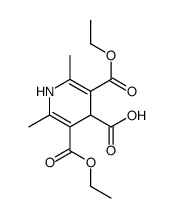19350-66-4
| Name | 3,5-bis(ethoxycarbonyl)-2,6-dimethyl-1,4-dihydropyridine-4-carboxylic acid |
|---|---|
| Synonyms |
2,6-Dimethyl-1,4-dihydro-pyridine-3,4,5-tricarboxylic acid 3,5-diethyl ester
2.6-dimethyl-3,5-diethoxycarbonyl-1-4-dihydroisonicotinic acid 3,5-Diethoxycarbonyl-2,6-dimethyl-1,4-dihydroisonicotinsaeure 2,6-Dimethyl-3,5-diethoxycarbonyl-1,4-dihydro-pyridin-4-carbonsaeure 3,4,5-pyridinetricarboxylic acid,1,4-dihydro-2,6-dimethyl-,3,5-diethyl ester 2,5-DIISOPROPYLPHENOL |
| Description | AV-153 free base, a 1,4-dihydropyridine (1,4-DHP) derivative, is an antimutagenic. AV-153 free base intercalates to DNA in a single strand break and reduces DNA damage, stimulates DNA repair in human cells in vitro. AV-153 free base interacts with thymine and cytosine and has an influence on poly(ADP)ribosylation. AV-153 free base has anti-cancer activity[1][2][3]. |
|---|---|
| Related Catalog | |
| In Vitro | AV-153 free base causes IC50s for Raji and HL-60 cells of 14.9 mM and 10.3 mM, respectively[1]. AV-153 free base (1 nM to 10 μM; 3 hours) reduces the level of spontaneously arising DNA single-strand breaks (SSBs) in peripheral blood lymphocytes or HL-60 cells by 13–67%[1]. |
| References |
| Density | 1.23g/cm3 |
|---|---|
| Boiling Point | 450.5ºC at 760mmHg |
| Molecular Formula | C14H19NO6 |
| Molecular Weight | 297.30400 |
| Flash Point | 226.3ºC |
| Exact Mass | 297.12100 |
| PSA | 101.93000 |
| LogP | 1.29340 |
| Vapour Pressure | 2.26E-09mmHg at 25°C |
| Index of Refraction | 1.51 |
| HS Code | 2933399090 |
|---|
| HS Code | 2933399090 |
|---|---|
| Summary | 2933399090. other compounds containing an unfused pyridine ring (whether or not hydrogenated) in the structure. VAT:17.0%. Tax rebate rate:13.0%. . MFN tariff:6.5%. General tariff:20.0% |

